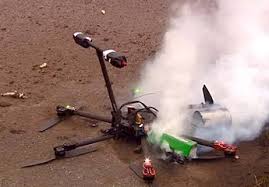Devon and Cornwall police warn activists as cull zone is massively expanded
Police have warned badger cull protesters that they may use drones to try to keep order in the far south-west of England following heightened tensions between activists and officers.
In an email to protesters seen by the Guardian, a Devon and Cornwall officer said the force would consider using drones “where intelligence dictates”.
The force said it was considering drones because of a spike in crimes in some areas within cull zones but protesters insisted the move would not stop them from trying to prevent badgers being killed.
The cull in England has been hugely expanded into 10 new areas, with up to 42,000 animals now due to be shot in an attempt to curb tuberculosis in cattle, up from 32,500 last year.
The increase is adding to pressure on police forces in these areas. In the email to the protester, the officer wrote: “I have been asked to let you know – and that you forward as you believe necessary – that a decision has been made that where intelligence dictates police will consider the deployment of drones.”
Andrea White, a spokeswoman for Devon County Hunt Saboteurs, said: “This escalation in police activity to monitor us with drones comes as no surprise. But whatever they throw at us, we will remain in the field throughout the entire cull, doing what we have always done: saving the lives of badgers.”
Jay Tiernan, a spokesperson for the direct action group Stop the Cull, said he thought police drones could be damaged by activists – or even by farmers who may not want their actions observed.
“We suspect any police drone deployed may end up getting seriously damaged, whether that’s catapults, air rifles or shotguns,” he said.
Tiernan said the increase in the number of cull areas had led to a dramatic rise in the number of activists and made it harder for the police to keep up with them.
Supt Richard Hooper-Bennett, silver commander for the badger policing operation in Devon and Cornwall, said: “Unfortunately, some areas within the cull zone have been subject to a disproportionate degree of criminality. Whilst we respect the right to peaceful protest and will always facilitate this, we also have a duty to protect our rural communities from crime.
“This means that where areas have been subject to repeated criminality, we may consider the use of drones to allow officers to have a clearer idea of what is happening in the areas surrounding them.”



